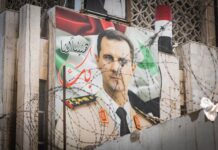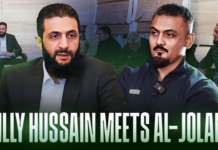CAGE’S Muhammad Rabbani, who will find out tomorrow whether he’ll be charged for refusing to hand over his computer and phone passwords at Heathrow Airport, has told 5Pillars that he’s making a stand against the oppressive Schedule 7 law which gives police broad powers to search individuals at border points without grounds for suspicion.
Rabbani, the international director of the advocacy group, was arrested and detained overnight by police last November but was released on bail and could be charged when he reports to the authorities on Wednesday. CAGE said Rabbani’s devices contained details about an “investigation into torture complicity by a UK ally.”
Schedule 7 has been criticised by human rights groups for its discriminatory implementation and impact on civil liberties. Under the powers, anything a person has on them can be confiscated, including communications and data storage devices. Statistics show that ethnic minorities and Muslims are disproportionately affected by the law.
Muhammad Rabbani spoke with 5Pillars editor Roshan Muhammed Salih earlier today.
Roshan Muhammed Salih: Are you expecting to be charged tomorrow?
Muhammad Rabbani: I’m not sure. I don’t deny the facts of what happened but I don’t believe I’ve committed an offence. So from one point of view I think I will get charged, but on the other hand why haven’t I been charged all this time as it’s been almost been six months?
RMS: From your reading of the Schedule 7 laws, is refusing to hand over passwords an offence or not?
Subscribe to our newsletter and stay updated on the latest news and updates from around the Muslim world!
MR: We need to differentiate between the law as it stands as passed by Parliament and the Code of Practice which was amended only a year and half ago. In the law itself there is no reference to passwords, absolutely none, but in the Code of Practice there is a reference but I believe that is an error.
In a way this is an unprecedented case because I don’t know anybody else who has been in a similar situation to mine – someone who has refused to give their passwords and asserted their innocence at the same time. So we’ll have to see what happens.

RMS: So for you this is an issue of principle and you are prepared to do your time in prison?
MR: I don’t want to knowingly do anything wrong, but in this case the law itself seems to be inadequate and inconsistent with the norms of due process in a fair and just society.
Some will think that I’m deliberately breaking the law, but some laws are unfair and they can be amended, changed and even removed. Being a good citizen doesn’t simply mean complying with every single law and policy that is passed. It means drawing attention to laws and policies that may be unfair, unjust and discriminatory and working to change them.
The Apartheid regime in South Africa did everything legally and so do those who are currently maintaining the oppression in the Occupied Territories in Palestine. So laws themselves are not always correct and it’s the role of a good citizen and a good Muslim to perform their duty and try to reform and bring about good for their society.
RMS: Why do you think the police wanted your passwords?
MR: CAGE does some important work which the state will be uncomfortable with because we are uncovering their history of involvement in crimes and abuses. For example, we were the first organisation to document the involvement of British officials in torture.
I’m not sure why they wanted the passwords. Part of me thinks it’s just to intimidate and apply pressure as a policy of disruption; I guess that’s a natural consequence for those who try to hold power to account, they will experience some pushback.
From another perspective any discussion connected to terrorism and violence and linked to Islam serves a very useful political goal for politicians. But I think we are contributing something that is very important for an open society.

RMS: Why did you refuse to hand the passwords over?
MR: I had an initial gut reaction when it happened and I acted on instinct. There’s somebody who’s vulnerable and who has survived more than a decade of torture who has entrusted us with the important role of organising his legal defence, so it was inconceivable that I was going to put that person, his family and his interests at risk.
But there’s a bigger thing at stake here which has wider relevance to the Muslim community. The way Schedule 7 operates is outside of the rule of law. They can stop people with no suspicion and if you are going to take away someone’s liberty you have to at least make a basic accusation of wrongdoing.
The Muslim community has been affected by this in a really big way; the figures are something like 50,000 people each year get stopped at border points and most of those people are non whites and 60-80 per cent are Muslims. So their holidays are being destroyed and their travel is being disrupted, but nobody speaks out about this because there is a general climate of fear. Non-Muslims have no clue that this power exists and has been there for 17 years but the average Muslim will know someone who’s been subjected to Schedule 7.
RMS: Anything else to add?
MR: Yes, I want to say something about how Muslims should react to this case. The typical response from the Muslim community would be “you got raided or sent to prison so you must have been up to no good,” or it will be “poor brother, let’s made dua for him or launch a campaign to free him.” But I don’t want people to look at it that way – I’m going into this eyes wide open and I’m not a victim, I don’t want anyone to do any campaigns to release me.
I just hope that any responsible member of society who found himself in my position would act like I did. I also want Muslims to see things differently – this should be a moment of pride and celebration for the Muslim community that there are some members of the community that are not going to fit the mould that our oppressors want us to fit. There are some members of the community that are not just going to complain but are going to take some legal steps which are outside the confined parameters of engagement while maintaining their integrity, humanity, commitment to principle and compassion for others.












![The Taliban’s Road To Success [Short Film]](https://5pillarsuk.com/wp-content/uploads/2024/11/Kabul-roadworks-thumbnail-218x150.png)









